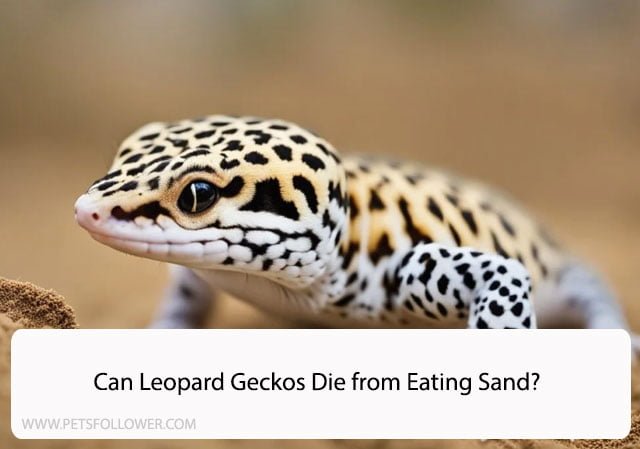Leopard geckos are fascinating creatures that make great pets. They are easy to care for and have a lifespan of up to 20 years. One of the most common questions that new owners ask is whether leopard geckos can die from eating sand. This is a valid concern, as sand is often used as a substrate in leopard gecko tanks.
The short answer is that yes, leopard geckos can die from eating sand. Sand is not a natural substrate for leopard geckos, and it can cause impaction in their digestive system. Impaction is a condition where the gecko’s intestines become blocked with sand, causing them to become impacted. This can lead to serious health problems, and in some cases, death.
Leopard Gecko Digestive System

Leopard geckos have a unique digestive system that allows them to consume a variety of prey items, including insects, worms, and even small rodents. Their digestive tract consists of several parts, including the mouth, esophagus, stomach, small intestine, and large intestine.
When a leopard gecko eats, the food is first broken down in the mouth by strong jaws and teeth. The food is then swallowed and passed down the esophagus to the stomach, where it is further broken down by stomach acid and digestive enzymes. From there, the food moves into the small intestine, where nutrients are absorbed into the bloodstream. Finally, any remaining waste is passed into the large intestine and eventually eliminated.
It is important to note that leopard geckos are not able to digest certain types of food, such as sand. While sand may seem like a natural substrate for leopard geckos, it can actually be harmful to their digestive system. If a leopard gecko ingests sand, it can cause impaction, which is a blockage in the digestive tract that can be fatal if left untreated.
To prevent impaction, it is recommended to use a substrate that is safe for leopard geckos, such as reptile carpet or paper towels. Additionally, it is important to ensure that any prey items offered to leopard geckos are appropriately sized and gut-loaded with nutritious food to ensure proper digestion.
Overall, understanding the unique digestive system of leopard geckos is crucial for their health and well-being. By providing a suitable substrate and appropriate prey items, we can help ensure that our leopard geckos thrive in captivity.
Risks of Sand Impaction

Leopard geckos are desert animals, and sand is often used as a substrate in their enclosures. However, sand can pose a risk of impaction, which can lead to serious health problems and even death.
Causes of Sand Ingestion
Leopard geckos may ingest sand while hunting for prey or simply exploring their environment. They may accidentally swallow sand while trying to catch insects, or they may ingest sand while licking their lips or cleaning their bodies.
Symptoms of Impaction
If a leopard gecko ingests too much sand, it can lead to impaction, which is a blockage in the digestive system. Symptoms of impaction may include:
- Loss of appetite
- Lethargy
- Swollen belly
- Difficulty defecating
- Regurgitation
- Dehydration
If left untreated, impaction can lead to serious health problems and even death. It is important to monitor your leopard gecko for any signs of impaction and seek veterinary care if necessary.
To reduce the risk of sand impaction, consider using alternative substrates such as reptile carpet, paper towels, or tile. If you must use sand as a substrate, make sure to provide a shallow water dish for your leopard gecko to soak in and help prevent dehydration. Additionally, avoid feeding your leopard gecko on sand and instead use a separate feeding dish.
Overall, sand impaction is a serious health concern for leopard geckos. By understanding the causes and symptoms of impaction and taking steps to prevent it, we can help ensure the health and well-being of our leopard gecko pets.
Preventing Sand-Related Health Issues

When it comes to caring for leopard geckos, providing a safe and appropriate substrate is crucial to prevent sand-related health issues. Here are some tips to help you prevent such issues.
Safe Substrate Alternatives
Although sand is a popular substrate choice for leopard geckos, it can cause impaction if ingested. Impaction occurs when the sand accumulates in the digestive tract, leading to blockages and other health problems. Therefore, it is recommended to use safe substrate alternatives such as reptile carpet, paper towels, or tile. These alternatives are easy to clean and do not pose any risk of ingestion.
Feeding Techniques to Avoid Sand Ingestion
Another way to prevent sand-related health issues is to adopt feeding techniques that avoid sand ingestion. One method is to feed your leopard gecko in a separate feeding container with a shallow dish. This will prevent the gecko from accidentally ingesting sand while hunting for its food. Additionally, you can use feeding tongs to offer food directly to your gecko, which will further reduce the risk of sand ingestion.
In conclusion, preventing sand-related health issues in leopard geckos is crucial for their overall health and well-being. By using safe substrate alternatives and adopting feeding techniques that avoid sand ingestion, we can ensure that our geckos remain healthy and happy.
Diagnosing Sand Impaction
When a leopard gecko ingests sand, it can lead to impaction, which is a blockage of the digestive tract. Symptoms of sand impaction include lethargy, loss of appetite, bloating, and constipation.
To diagnose sand impaction, we first need to perform a physical examination of the gecko. We may feel for any lumps or blockages in the abdomen and check for any signs of discomfort or pain.
If we suspect sand impaction, we may also perform an X-ray to confirm the presence of sand in the digestive tract. This will help us determine the severity of the impaction and the best course of treatment.
It’s important to note that not all cases of sand ingestion will lead to impaction. However, it’s always best to err on the side of caution and provide a substrate that is safe for your leopard gecko to ingest.
In conclusion, diagnosing sand impaction in leopard geckos requires a physical examination and potentially an X-ray. If you suspect your gecko has ingested sand, it’s important to seek veterinary care to ensure prompt treatment.
Treatment Options for Sand Impaction
If you suspect that your leopard gecko has ingested sand and is experiencing impaction, it is important to take action immediately. Here are some treatment options that can help:
- Provide a Warm Bath: Soaking your leopard gecko in a warm bath can help to soften the blockage and encourage it to pass. Make sure the water is warm but not too hot, and keep your gecko in the water for about 15-20 minutes.
- Increase Hydration: Encourage your leopard gecko to drink more water by offering a shallow dish of fresh water. You can also use a syringe to gently squirt water into their mouth if they are not drinking on their own.
- Adjust Diet: If your leopard gecko has been eating sand, it is important to switch to a different substrate such as reptile carpet or paper towels. You can also adjust their diet to include more moisture-rich foods such as insects that have been gut-loaded with water-rich vegetables.
- Seek Veterinary Care: If your leopard gecko is not passing the blockage or is showing signs of distress such as lethargy or loss of appetite, it is important to seek veterinary care immediately. Your veterinarian may recommend additional treatment options such as medication or surgery.
Remember, prevention is the best course of action when it comes to sand impaction in leopard geckos. By providing a proper diet, hydration, and substrate, you can help to keep your gecko healthy and happy.
Recovery and Long-Term Health

If a leopard gecko consumes a small amount of sand accidentally, it is unlikely to cause any long-term harm. However, if a gecko ingests a significant amount of sand, it can lead to impaction, which may require veterinary treatment.
If your leopard gecko has ingested sand, it is essential to monitor its behavior and bowel movements closely. If you notice any signs of lethargy, loss of appetite, or constipation, it is crucial to seek veterinary attention immediately.
To prevent impaction, it is advisable to provide your leopard gecko with a substrate that is safe for ingestion, such as reptile carpet or paper towels. Additionally, providing a shallow dish of water for soaking can help prevent dehydration and aid in digestion.
In the long term, it is essential to maintain a healthy diet and provide your leopard gecko with a suitable environment to prevent health issues. A balanced diet should consist of live insects, such as crickets and mealworms, and occasional treats such as waxworms or pinkie mice.
Overall, while sand ingestion can be harmful to leopard geckos, proper care and monitoring can prevent long-term health issues.
Frequently Asked Questions
What are the potential health risks of leopard geckos ingesting sand?
Leopard geckos can suffer from impaction, a condition where the sand accumulates in their digestive system and obstructs their intestines. This can lead to a variety of health issues, including dehydration, constipation, and even death.
Which substrates are considered safe for leopard geckos to prevent ingestion-related issues?
Non-particulate substrates such as reptile carpet, paper towels, and tile are considered safe for leopard geckos as they do not pose a risk of ingestion-related issues.
How does sand impaction affect the health of a leopard gecko?
Sand impaction can cause a variety of health issues in leopard geckos, including dehydration, constipation, and even death. If left untreated, it can lead to serious health complications.
What are the symptoms of sand impaction in leopard geckos?
Symptoms of sand impaction in leopard geckos include lack of appetite, lethargy, bloating, and difficulty defecating. In severe cases, a leopard gecko may become impacted and require veterinary intervention.
What immediate steps should be taken if a leopard gecko has ingested sand?
If a leopard gecko has ingested sand, it is important to monitor their behavior closely for any signs of impaction. If symptoms arise, it is recommended to seek veterinary care immediately.
Aside from ingestion, what other health concerns can arise from using sand as a substrate for leopard geckos?
In addition to ingestion-related issues, sand can also cause skin irritation and abrasions in leopard geckos. It can also harbor harmful bacteria and parasites, leading to infections and other health complications.





